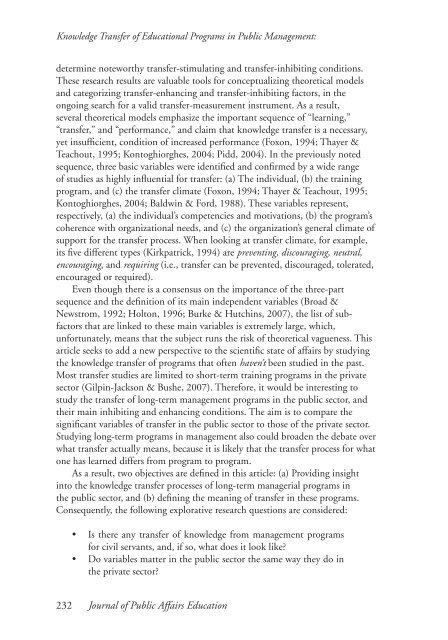JOURNAL OF PUBLIC AFFAIRS EDUCATION - Naspaa
JOURNAL OF PUBLIC AFFAIRS EDUCATION - Naspaa
JOURNAL OF PUBLIC AFFAIRS EDUCATION - Naspaa
Create successful ePaper yourself
Turn your PDF publications into a flip-book with our unique Google optimized e-Paper software.
Knowledge Transfer of Educational Programs in Public Management:determine noteworthy transfer-stimulating and transfer-inhibiting conditions.These research results are valuable tools for conceptualizing theoretical modelsand categorizing transfer-enhancing and transfer-inhibiting factors, in theongoing search for a valid transfer-measurement instrument. As a result,several theoretical models emphasize the important sequence of “learning,”“transfer,” and “performance,” and claim that knowledge transfer is a necessary,yet insufficient, condition of increased performance (Foxon, 1994; Thayer &Teachout, 1995; Kontoghiorghes, 2004; Pidd, 2004). In the previously notedsequence, three basic variables were identified and confirmed by a wide rangeof studies as highly influential for transfer: (a) The individual, (b) the trainingprogram, and (c) the transfer climate (Foxon, 1994; Thayer & Teachout, 1995;Kontoghiorghes, 2004; Baldwin & Ford, 1988). These variables represent,respectively, (a) the individual’s competencies and motivations, (b) the program’scoherence with organizational needs, and (c) the organization’s general climate ofsupport for the transfer process. When looking at transfer climate, for example,its five different types (Kirkpatrick, 1994) are preventing, discouraging, neutral,encouraging, and requiring (i.e., transfer can be prevented, discouraged, tolerated,encouraged or required).Even though there is a consensus on the importance of the three-partsequence and the definition of its main independent variables (Broad &Newstrom, 1992; Holton, 1996; Burke & Hutchins, 2007), the list of subfactorsthat are linked to these main variables is extremely large, which,unfortunately, means that the subject runs the risk of theoretical vagueness. Thisarticle seeks to add a new perspective to the scientific state of affairs by studyingthe knowledge transfer of programs that often haven’t been studied in the past.Most transfer studies are limited to short-term training programs in the privatesector (Gilpin-Jackson & Bushe, 2007). Therefore, it would be interesting tostudy the transfer of long-term management programs in the public sector, andtheir main inhibiting and enhancing conditions. The aim is to compare thesignificant variables of transfer in the public sector to those of the private sector.Studying long-term programs in management also could broaden the debate overwhat transfer actually means, because it is likely that the transfer process for whatone has learned differs from program to program.As a result, two objectives are defined in this article: (a) Providing insightinto the knowledge transfer processes of long-term managerial programs inthe public sector, and (b) defining the meaning of transfer in these programs.Consequently, the following explorative research questions are considered:• Is there any transfer of knowledge from management programsfor civil servants, and, if so, what does it look like?• Do variables matter in the public sector the same way they do inthe private sector?232 Journal of Public Affairs Education
















